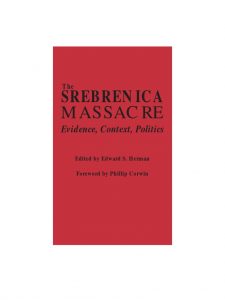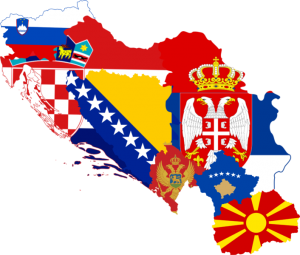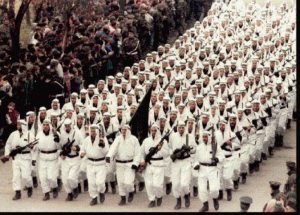
Views: 1939
 On July 11, 1995, the town of Srebrenica fell to the Bosnian Serb army. At the time, I was the highest ranking United Nations civilian official in Bosnia-Herzegovina. In my book, Dubious Mandate,1 I made some comments on that tragedy. Beyond that, I decried the distortions of the international press in their reporting, not only on that event, but on the wars in Yugoslavia (1992-95) in general. I expressed the wish that there could have been, and must be, some balance in telling the story of what actually happened in Srebrenica and in all of former Yugoslavia, if we are to learn from our experience.
On July 11, 1995, the town of Srebrenica fell to the Bosnian Serb army. At the time, I was the highest ranking United Nations civilian official in Bosnia-Herzegovina. In my book, Dubious Mandate,1 I made some comments on that tragedy. Beyond that, I decried the distortions of the international press in their reporting, not only on that event, but on the wars in Yugoslavia (1992-95) in general. I expressed the wish that there could have been, and must be, some balance in telling the story of what actually happened in Srebrenica and in all of former Yugoslavia, if we are to learn from our experience.
This book by the Srebrenica Research Group, The Srebrenica Massacre: Evidence, Context, Politics, answers that call. It presents an alternative and well-documented assessment of the tragedy of Srebrenica, and of the suffering of all the constituent peoples of former Yugoslavia. It is an invaluable document.
Of course, there will be those who will disagree with the authors’ perspective. But if we are to open a discussion that has been closed to all but the faithful, if we are to prevent similar tragedies from occurring again, then we must take seriously the accounts put forward by the bright and discerning contributors to this book. No honest reader can doubt the credentials of these authors. And no honest reader should doubt the importance of what they have to say. I congratulate them on their scholarship and their courage.
Book: To access the complete pdf file of this important study click here
Table of contents
Maps • 4-6
Foreword • 7
Phillip Corwin
Preface • 13
Edward S. Herman
Chapter 1. Introduction • 19
Edward S. Herman
Chapter 2. Prelude to the Capture of Srebrenica • 37
George Bogdanich
Chapter 3. The Military Context of the Fall of Srebrenica • 66
Tim Fenton
Chapter 4. The Numbers Game • 101
Jonathan Rooper
Chapter 5. Securing Verdicts:
The Misuse of Witness Evidence at the Hague • 153
George Szamuely
Chapter 6. The ICTY and Srebrenica • 211
Michael Mandel
Chapter 7. UN Report on Srebrenica—
A Distorted Picture of Events • 224
George Bogdanich
Chapter 8. U.S. Media Coverage of Srebrenica • 248
Edward S. Herman
Chapter 9. U.K. Media Coverage of Srebrenica • 259
Philip Hammond
Chapter 10. Summary and Conclusions • 278
Edward S. Herman
Note on Contributors • 299
Originally published on 2011-06-04
Source: Srebrenica Research Group
Read our Disclaimer/Legal Statement!
Donate to Support Us
We would like to ask you to consider a small donation to help our team keep working. We accept no advertising and rely only on you, our readers, to keep us digging the truth on history, global politics and international relations.
[wpedon id=”4696″ align=”left”]










